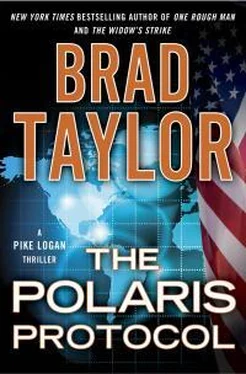He’d taken some vacation time a few days before, ostensibly visiting relatives in Canada. The Taskforce had gone to work, tracking his credit cards and cell phone usage. They’d found cellular data and credit purchases that tied Booth to El Paso earlier in the month, but the recent history was blank. He hadn’t used his cell phone or credit cards in days. The last purchase they could find had been for one round-trip ticket to Mexico City from Denver, returning yesterday. He had not used the second leg, which made perfect sense, given I’d seen him at the museum earlier that day running like a girl.
With Arthur Booth’s personal digital trail a dead end, the Taskforce dug deeper, scanning official domestic databases, probing with a wide net to find some link that would lead them to the target, and had gotten lucky. Arthur Booth had gone through immigration at Dallas earlier today, with onward travel to Colorado Springs.
Originally ordered to bring the computer to the might of the Taskforce fifty-pound heads in Washington, DC, we’d been redirected midflight to Colorado Springs with a dual purpose. The hacking cell would go to work on the computer here, in a makeshift operations center, and we would go after Booth.
We’d gotten a dry hole at his apartment, but I hoped something inside there would give us a clue as to where he had gone. Ordinarily, we’d just have sat there waiting, for days if necessary, instead of attempting a break-and-enter, but we didn’t have that luxury this time.
Which is exactly why we hadn’t simply alerted domestic authorities, claiming Booth was a serial killer or something else that would get him on every beat cop’s radar screen. We couldn’t break him free from the police without raising an enormous flag as to who we were and why we wanted him. The decision had been made to do a domestic Taskforce operation, against a US citizen, which was a big decision indeed.
Operating domestically was forbidden by the Taskforce charter, precisely because we had the ability to break quite a few constitutional protections afforded the average United States citizen. We didn’t have congressional oversight like the intelligence community and the Department of Defense. Without this scrutiny, the Taskforce had the capacity to grow into something cancerous, becoming the very threat we were created to fight, and thus the decision had been made to keep it off US soil. Keep the beast at bay in the hinterlands, as it were, doing evil so good may come.
We had operated domestically in the past, but against foreign targets, as we had in the Dallas airport. We’d conducted only one operation domestically against a US citizen, but the threat had been overwhelming—a domestic terrorist attack to destroy our power grid—and it was judged that the Taskforce was the lone tool that could solve the problem. I remembered well the enormous debate surrounding that mission, because I’d been at the heart of it. We had succeeded, and apparently, that had made this debate a little easier.
I was happy with the verdict, but I’d be lying if I said it didn’t give me a little unease. With only the Oversight Council as a decision maker, there was the threat of hasty judgments based on emotion or an imperfect intelligence picture, something I’d seen happen only six months ago on another operation, causing Kurt Hale to offer his resignation.
A problem to worry about later. Right now, I had an asshole on the loose that I needed to capture to stop a catastrophe, and little time to worry about any constitutional niceties.
Although there was still a glow of twilight, I judged it dark enough to execute. I turned to Jennifer. “You ready?”
“Yeah. I see my route. I’ll use the balconies.”
The building was a four-story brick structure with a single access point on the ground floor, secured with a keypad. From our reconnaissance earlier, we’d learned that the entrance could be unlocked from the apartments themselves, as we’d seen a pizza delivery guy speak into a box, then pull the door open. That was now Jennifer’s mission.
Dressed like Catwoman, in a black Lycra Under Armour shirt and leggings that fit like a second skin, she was going to scale to the fourth-floor apartment, break in through the sliding glass door, then hit the entrance button.
I said, “Get moving. We’re wasting time.”
She exited the vehicle; scurried through the foliage, avoiding the pool of light from a streetlamp; and reached the corner of the building.
A voice in the backseat said, “Who is that chick? I didn’t think we had any female operators.”
His name was Bartholomew Creedwater, and he was supposedly the best computer guy the Taskforce had. He’d probably never once left his little hole inside Taskforce headquarters in DC, and he was treating this whole operation as the time of his life.
Beside him, Decoy said, “I didn’t think so either, until I saw her do some shooting in Mexico.”
I said, “She’s a monkey. She can climb just about anything, which comes in handy during situations like this.”
Standing on the railing of the bottom balcony, Jennifer leapt up and grasped the concrete of the balcony above. From there, she began to move like a lizard, seeming to flow upward against gravity.
Creedwater said, “That is positively amazing. Where’d she come from?”
I said, “Cirque du Soleil. She’s a gymnast.”
We continued to watch her climb, Creedwater acting like he was in a spy movie, his mouth hanging open.
He said, “I wonder if she likes computer geeks.”
What? I looked at him, and I swear I thought he was constructing some fantasy in his head. “Hey, keep focused on the mission. I didn’t drag you out here so you could watch a show.”
We were bringing him and his skills into the apartment to survey whatever electronic stuff was available, hoping to find a lead. His mission ended at a keyboard. He snapped his mouth closed, embarrassed.
Decoy said, “Yeah, Creed. Trust me, you don’t want to go after Jennifer. It’ll make some people mad.”
I snapped my head toward him, wondering. Is that because I almost bit his head off for what he’s said about Jennifer in the past? Or does he know? Did Knuckles talk?
Decoy had a little grin on his face, giving nothing away.
Through my earpiece I heard, “On the balcony.”
I said, “Roger,” signaled Creed in the backseat, and opened the door to the car.
We walked with purpose to the front door of the complex, leaving Decoy behind as early warning in case Booth came back while we were inside.
We reached the entrance just as Jennifer said, “I’m in.”
71
We waited less than thirty seconds before hearing the door buzz. A minute later, we were inside the apartment. It was your typical furnished rental, with a cheap sofa, chipped end tables, and absolutely no personal effects. No pictures on the walls, books, or anything else. Sitting next to a wide-screen TV, I saw an Alienware desktop computer that looked like it belonged to NASA. I pointed to it and said, “First things first, get all electronic devices next to that computer. Creed, get to work.”
He laid a backpack on the ground and began pulling out all sorts of black-magic devices. Jennifer went into the bedroom.
I watched Creed attack the computer, fascinated that anyone could do what he was doing. I was pretty tech savvy, but this guy was on a whole different level. He had the monitor running script that looked like the Matrix but seemed to understand what he was reading.
I said, “Why can’t you guys do this with the laptop we brought?”
Still working, he said, “We scanned it, and there are indicators of little booby traps threaded throughout. The guy who created that program is pretty damn good with code. Trust me, I could get into the computer, but I’m afraid that I’ll cause the software program to self-destruct. We lose that thing, and we’ll have no way to turn off the threat. Given enough time, I could do it, but not in two hours.”
Читать дальше












